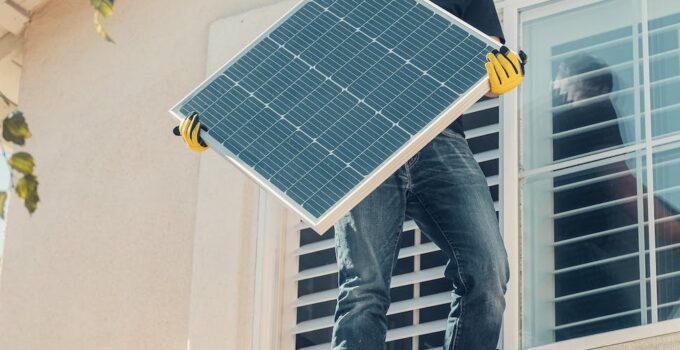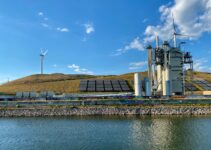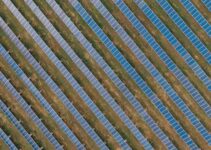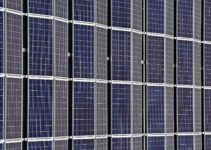When considering installing solar panels on your roof, one of the common concerns is whether they can cause damage. It’s important to separate fact from fiction and understand the true impact of solar panels on your roof.
In this article, we will debunk the myths surrounding solar panels and their effect on your roof. So, let’s address the question: Can solar panels damage your roof?
The Impact of Solar Panels on Roof Lifespan
Many homeowners worry that solar panels can shorten the lifespan of their roof. However, numerous studies have shown that solar panels can actually protect and extend the life of your roof. Here’s why:
- Increased Roof Protection: Solar panels act as a shield against various weather elements such as rain, hail, and UV rays. This protective layer prevents direct contact between your roof and these damaging factors, preserving the quality of your roof materials.
- Reduced Roof Deterioration: By blocking the sun’s rays, solar panels help reduce the heat absorbed by your roof. This cooling effect can prevent premature aging and deterioration of your roof, ultimately leading to an extended lifespan.
- Enhanced Roof Insulation: Solar panels create an additional layer of insulation on your roof, improving energy efficiency and reducing thermal transfer. This insulation helps regulate indoor temperature, reducing the strain on your HVAC system and potentially lowering energy costs.
In conclusion, solar panels can actually benefit your roof by providing increased protection, reducing deterioration, and enhancing insulation.
Examining the Structural Integrity of Your Roof with Solar Panels
Another concern among homeowners is whether their roof can support the weight of solar panels. It’s crucial to assess the structural integrity of your roof before installing solar panels. Here’s what you need to consider:
- Roof Load-Bearing Capacity: Solar panels are designed to distribute their weight evenly across the roof. However, it’s important to ensure that your roof can handle the additional load. Consulting a structural engineer or a professional solar panel installer can help determine the load-bearing capacity of your roof.
- Roof Age and Condition: Older roofs or those in poor condition may require additional reinforcement to support solar panels. Conducting a thorough roof inspection is recommended to identify any existing issues that need to be addressed before installation.
By assessing your roof’s load-bearing capacity and condition, you can ensure a safe and secure installation of solar panels without compromising the structural integrity of your roof.
Preventing Roof Leaks: How Solar Panels Can Help
One of the most common misconceptions about solar panels is that they can cause roof leaks. However, when installed correctly, solar panels can actually help prevent roof leaks. Here’s how:
- Waterproofing and Sealants: Professional solar panel installers use high-quality waterproofing materials and sealants to ensure a watertight installation. These materials act as a barrier, preventing water from seeping through the roof and causing leaks.
- Improved Drainage: Solar panels are typically installed with a slight tilt to allow for proper water drainage. This design feature helps prevent water from pooling on your roof, reducing the risk of leaks.
By employing proper installation techniques and materials, solar panels can actually enhance the waterproofing capabilities of your roof, minimizing the chances of leaks.
Dispelling the Myth of Roof Damage from Solar Panel Installation
Some homeowners worry that the installation process itself can cause damage to their roof. However, professional solar panel installers follow industry best practices to ensure a safe and non-intrusive installation. Here’s why solar panel installation doesn’t damage your roof:
- No Roof Penetration: Solar panels are typically mounted on racks that are secured to your roof without penetrating the surface. This method eliminates the risk of roof damage caused by holes or leaks.
- Protective Layers: Installers apply protective layers, such as flashing and underlayment, to safeguard your roof during the installation. These layers provide an extra level of protection against potential damage.
By relying on professional installers and their expertise, you can rest assured that the installation process will not harm your roof.
The Benefits of Proper Roof Preparation for Solar Panel Installation
Before installing solar panels, it’s essential to properly prepare your roof to ensure optimal performance and longevity. Here are the benefits of preparing your roof for solar panel installation:
- Roof Maintenance: Preparing your roof involves addressing any existing maintenance issues, such as repairing damaged shingles or fixing leaks. By addressing these problems beforehand, you can ensure the long-term integrity of your roof.
- Optimized Solar Panel Placement: Proper roof preparation allows for strategic placement of solar panels, maximizing their exposure to sunlight and optimizing energy production.
- Streamlined Installation Process: Preparing your roof in advance ensures a smoother and more efficient installation process. This preparation includes assessing the roof’s condition, reinforcing weak areas, and making any necessary adjustments.
By investing time in properly preparing your roof, you can maximize the benefits of solar panel installation and ensure the long-term performance of both your roof and solar system.
Maintaining Your Roof’s Warranty with Solar Panels
Many homeowners worry that installing solar panels will void their roof’s warranty. However, this is often a misconception. Here’s how solar panels can coexist with your roof warranty:
- Roof Warranty Terms: Review the terms and conditions of your roof warranty to determine if solar panel installation affects its coverage. Some warranties may have specific requirements or exclusions related to solar panels.
- Professional Installation: Opt for professional solar panel installation to minimize the risk of any potential warranty conflicts. Experienced installers are familiar with warranty considerations and can ensure compliance with the manufacturer’s guidelines.
- Communication with Roof Manufacturer: If you have concerns about your warranty, reach out to the roof manufacturer or consult with a professional solar panel installer. They can provide guidance on how to navigate any warranty-related issues.
By understanding your roof warranty and working with knowledgeable professionals, you can confidently install solar panels without compromising your warranty coverage.
Frequently Asked Questions
Q: Will solar panels decrease the lifespan of my roof?
A: No, solar panels can actually extend the lifespan of your roof by providing additional protection and reducing deterioration caused by weather elements.
Q: Can my roof support the weight of solar panels?
A: Before installation, it’s important to assess the structural integrity of your roof. Consulting a professional can help determine if additional reinforcement is necessary.
Q: Will solar panels cause roof leaks?
A: When installed correctly, solar panels can help prevent roof leaks. Professional installers use waterproofing materials and ensure proper drainage to minimize the risk of leaks.
Q: Does solar panel installation damage the roof?
A: No, professional solar panel installation does not damage the roof. Installers utilize non-penetrative mounting methods and apply protective layers to safeguard the roof.
Q: Will installing solar panels void my roof warranty?
A: It depends on the terms of your roof warranty. Review the warranty and consult with professionals to ensure compliance and address any concerns.
Expert Advice
When it comes to the question of whether solar panels can damage your roof, the consensus among experts is that they can actually benefit your roof. Solar panels provide increased protection, reduce deterioration, and enhance insulation, ultimately extending the lifespan of your roof. To ensure a successful installation and minimize any potential risks, it’s crucial to work with experienced solar panel installers and consult with professionals when needed.
Remember, proper roof preparation, regular maintenance, and compliance with warranty terms are key factors in maintaining the integrity of both your roof and solar panel system. By understanding the facts and debunking the myths, you can confidently embrace the benefits of solar energy without worrying about roof damage.






